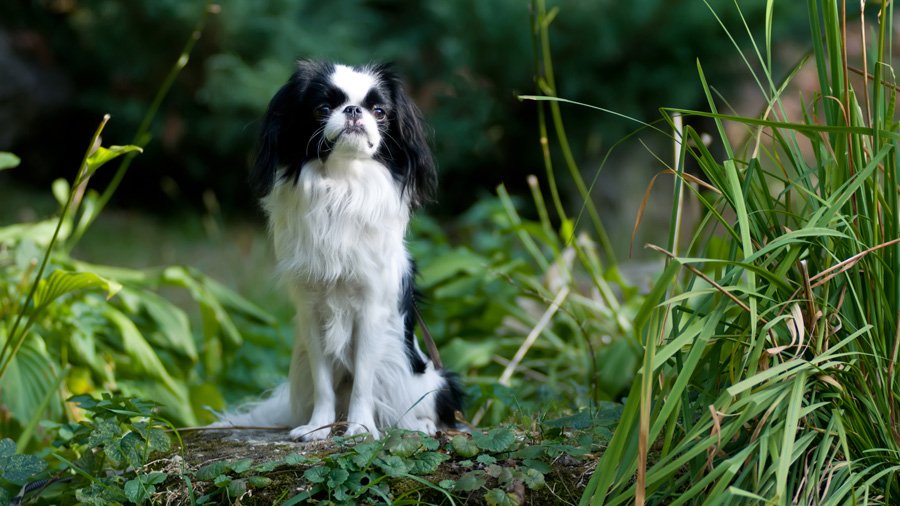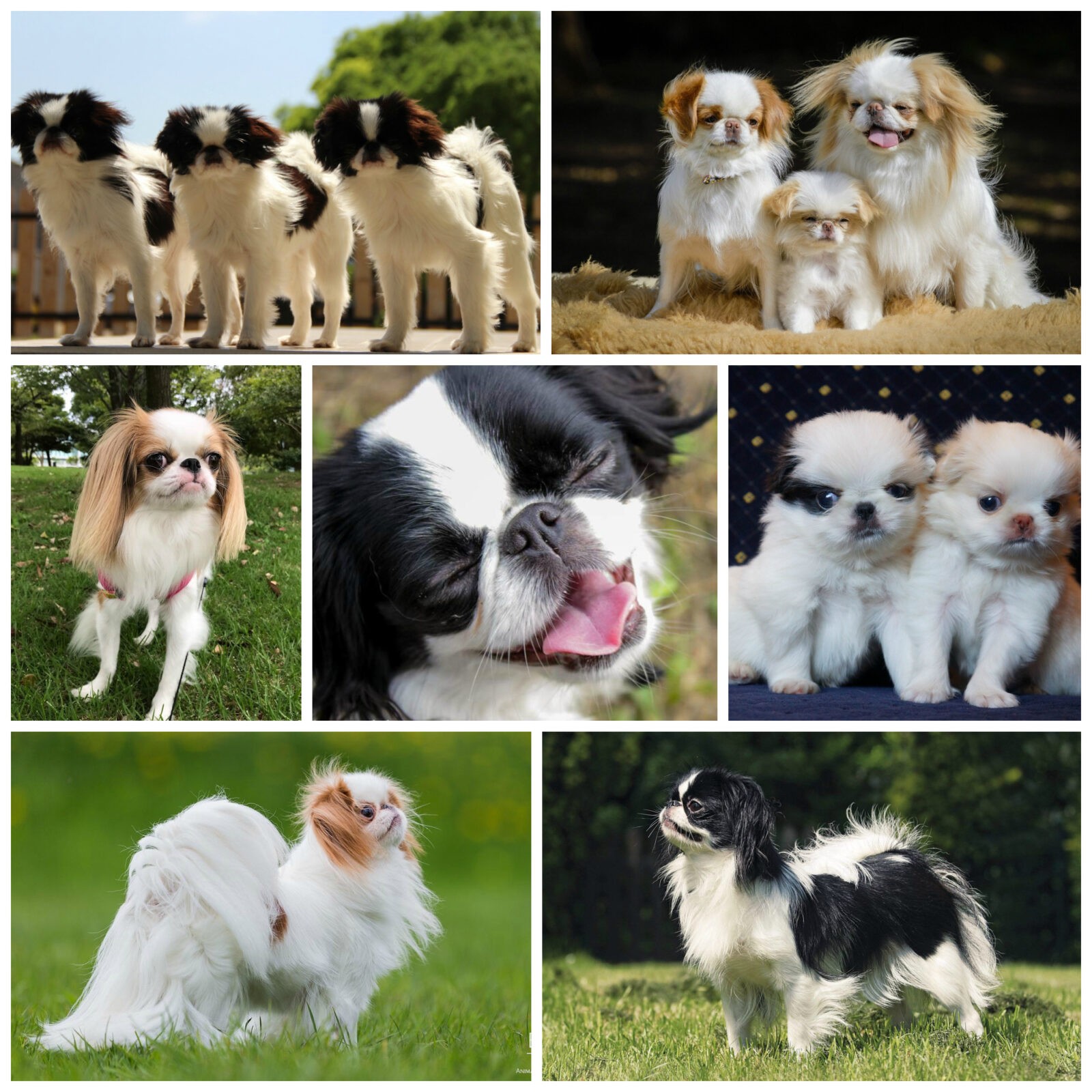Японский хин — это порода собак родом из Азии. Там эта собака считается лучшим животным — компаньоном. Японский хин отличается игривым и веселым характером, а также элегантным внешним видом.

Краткое описание породы Японский хин
Японский хин обладает кошачьими привычками. Он обожает лазить по шкафам, взбираться на высокую мебель. А также он обладает удивительной способностью прыгать. Кроме того, эта собака обожает умываться. Таким поведением она, действительно, очень напоминает кошку.
Несмотря на наличие определенного поведенческого сходства с кошкой, японский хин обладает всеми качествами собаки. Он очень радуется, когда находится среди семьи, такая собачка — просто прирожденный друг человека.
Жить хин может в любой квартире, даже в небольшой комнатушке. Но вот небольшие размеры животного говорят о том, что японский хин не сможет жить на улице или в питомнике. Собаки этой породы обладают классическим внешним видом. У них широкая голова, широко посаженные глаза, маленькие V-образные ушки, которые свисают вниз и очаровательный хвост, являющимся важным украшением представителей этой породы.
Увидев японского хина, вы будете убеждены в том, что он обильно линяет. Такое мнение складывается из-за достаточно длинной шерсти. Но ведь вы знаете, что внешность обманчива! Шерсть — главное украшение, но она требует к себе должного ухода. Если вы хотите иметь домашнего любимца с непревзойденным внешним видом, будьте готовы к ежедневной процедуре вычесывания. Эта необходимость вызвана не линькой, а лишь тем, что шерсть японского хина очень быстро запутывается.
Дрессировать японского хина не так уж и сложно. Но собака достаточно своенравна. Если занятия будут скучными, ваш питомец не будет выполнять ни единой команды. Дрессировки в домашних условиях непросты, но если вы будете последовательны, то добьетесь желаемого результата.
Если описать японского хина в одной фразе, то тогда следует сказать: «Японский хин — это удивительно дружелюбная собачка, которая может поладить со всеми». Он ласков с другими собаками и кошками. Несмотря на нежность, собачка не подойдет для семей с маленькими детьми, которые могут нанести вред питомцу.
Собака несколько застенчива среди незнакомцев. Очень часто японский хин старается спрятаться, когда в дом приходят гости, но как только собачка познакомится, она с радостью будет играться с вашими гостями.
Японский хин не требует большого количества упражнений, поэтому прекрасно подходит тем людям, которые не любят активный способ жизни. Тем ни менее, собака обожает ежедневные прогулки и игры с хозяином. Если вы не будете гулять со своим питомцем на воздухе, то его поведение может резко испортиться.
Собаки этой породы могут подстраиваться не только к бытовым условиям, но и к эмоциональной атмосфере. Если японский хин будет проживать в доме, где проживают спокойные, молчаливые люди, то и животное станет молчаливым и малозаметным. Ну, и наоборот, проживая в доме с активными шумными людьми, собака станет такой же активной и полной энергии.
Веселый нрав и преданность этой собаки часто становится причиной привыкания и любви к животному. Чаще всего, члены семьи, где живет японский хин, уже не могут представить жизнь без питомца, как и он без них. Никогда нельзя оставлять такую собаку надолго в одиночестве. Это может привести к серьезной психологической травме. Японский хин — это животное, которое безумно боится потерять своего хозяина.
Основная информация
| Название породы: | Японский хин |
| Страна происхождения: | Япония |
| Время зарождения породы: | XIV век |
| Тип: | декоративные и собаки-компаньоны |
| Вес: | 1,8 – 3,5 кг |
| Рост (высота в холке): | 24 – 26 см |
| Продолжительность жизни: | 12 – 14 лет |
|
Классификация МКФ:
|
Группа 9, Секция 8, Номер 206 |
| Цена щенков: | 150 – 1650 $ |
| Самые популярные клички: | список кличек для японского хина |
Оценка характеристик породы Японский хин
| Адаптивность
(определение, означающее, насколько легко собака может приспосабливаться к изменениям в жизни) |
🐶🐶🐶🐶🐶 |
| Уровень линьки
(Уровень и частота выпадения волос у животного) |
🐶🐶🐶 |
| Уровень нежности
(Уровень и количество нежности и ласки, которую собака отдает взамен на внимание к себе) |
🐶🐶🐶🐶🐶 |
| Потребности в упражнениях
(Уровень дневной активности собаки) |
🐶 |
| Социальная потребность
(Необходимое количество контактов собаки с другими животными, а также людьми) |
🐶🐶🐶🐶🐶 |
| Квартирное содержание
(Фактор, определяющий уровень шума и иных неудобств, которые собака может доставлять хозяевам в соотношении размера квартиры к размеру собаки) |
🐶🐶🐶🐶🐶 |
| Груминг
(Количество купаний, расчесываний, а также необходимое количество сеансов профессионального груминга, необходимого собаке) |
🐶🐶 |
| Дружелюбность в незнакомой среде
(Особенности поведения собаки в обществе с незнакомыми людьми или в незнакомой обстановке) |
🐶🐶🐶🐶🐶 |
| Тенденция к лаю
(Склонность к лаю и его частоте и громкости) |
🐶🐶 |
| Вопросы здоровья
(Потенциальный уровень состояния здоровья собаки) |
🐶🐶🐶 |
| Территориальность
(Склонность собаки к защите своего дома, двора или даже автомобиля хозяина) |
🐶🐶🐶🐶 |
| Дружелюбность к котам
(Тенденция к терпимости к кошкам и пониженное проявление охотничьих инстинктов) |
🐶🐶🐶🐶🐶 |
| Интеллект
(Способность собаки к мышлению и решению возникающих трудностей (не стоит путать с обучаемостью!) |
🐶🐶🐶 |
| Воспитание и дрессировка
(Уровень сложности в обучении собаки выполнять определенные действия) |
🐶🐶🐶 |
| Дружелюбность к детям
(Фактор, определяющий насколько собака дружелюбна к детям, любит ли она с ними играть и терпеть некоторые детские шалости) |
🐶🐶 |
| Игровая активность
(Понятие определяется самим его названием, и, как правило, встречается почти у всех собак) |
🐶🐶🐶 |
| Наблюдательность
(Способность собаки определить присутствие чужого на своей территории) |
🐶🐶🐶🐶 |
| Дружелюбность к другим собакам
(Склонность собаки находить общий язык с другими своими сородичами) |
🐶🐶🐶 |
Японский хин фото:

История происхождения
Японский хин является очень древней породой, которая, вероятнее всего, возникла при императорском дворе. Этих собак в древние времена дарили самым дорогим и важным гостям. Многие считают, что именно в качестве подарка японскому Императору хин и попал в монарший двор.
Многие в древности думали, что японский хин это не просто собака, а собака, скрещенная с каким-то другим существом. На самом деле, исследователи считают, что для вывода японского хина использовался, в частности, спаниель.
Обычные смертные не знали о существовании японского хина вплоть до 1853 года. Именно в этом году торговцы смогли купить эту собаку и пересечь с ней океан. Так японский хин попал в Европу и на Американский континент.
Среди первых американских владельцев японского хина был президент Франклин Пирс и другие известные политики США. Эта собака стала признаком богатства и значимости владельца. В Америке эта порода была известна как японский спаниель, это название существовало вплоть до 1977 года.
Характер японского хина
Японский хин — это настоящее проявление любви, жизнерадостности и внимания к своей семье. Собаки хотят получать взаимное внимание и любовь, так как сами отдают их хозяину с избытком. Питомцы этой породы игривы и всегда в хорошем настроении. Особенно популярны японские хины благодаря своему доброму озорству.
Собак этой породы часто сравнивают с кошками благодаря тому, что они могут лазить, иногда даже по деревьям, взбираясь достаточно высоко. Они обожают людей, а поэтому им очень требуется человеческое общение. В противном случае питомец не будет чувствовать себя счастливым. Такие личные качества характера делают его отличной собакой-компаньоном, который готов проводить время как с взрослыми, так и с детьми.
Содержание и уход
Длинная, шелковистая шерсть японского хина заставляет некоторых начинающих собаководов думать об особых трудностях ухода за ней. На самом деле ухаживать за шерстью этой собаки несложно. Непродолжительное ежедневное расчесывание полностью избавит питомцев от катышей и запутывания. Обильную чистку необходимо производить всего лишь раз в неделю. Купают японских хинов по мере необходимости. Многие владельцы предпочитают использовать сухой шампунь, чтобы сократить число купаний.
Регулярно проверяйте уши собаки на наличие признаков инфекции, воспалений и загрязнений. Очищать уши лучше всего специальным тампоном и раствором, назначенным ветеринаром. Для предотвращения образования зубного камня и неприятного запаха изо рта необходимо еженедельно чистить хину зубы. К ежемесячным процедурам относится и подстригание когтей.
Дрессировка и обучение
Здоровье и болезни
Несколько интересных фактов
- Поведение японского хина несколько схоже с поведением кошки. Собаки этой породы часто облизывают себя, они обожают лазить по шкафам и диванам.
- Для приведения шерсти в норму и поддержания элегантного внешнего вида вам понадобятся несколько минут ежедневных вычесываний, так как шерсть собаки быстро путается.
- Часто японские хины не переносят жару. Будьте предельно осторожны с прогулками в знойные дни.
- Из-за особенностей строения головы, японские хины часто фыркают и чихают. Случаются даже приступы! Если вы заметили, что собака начала очень сильно чихать или фыркать, то не нужно паниковать! В таких случаях собаку нужно взять на руки и помочь ей успокоиться.
- Хотя японские хины не особо требовательны, все же, их нужно занимать веселым времяпрепровождением. В случае отсутствия которого, вы рискуете тем, что собака будет бегать по дому.
- Собаки этой породы отлично ладят с детьми старшего возраста. Не стоит приобретать собаку, если у вас маленькие дети. Они могут нанести вред животному.
- Японский хин нормально развивается и растет только в случае, когда он содержится вместе с семьей под одной крышей. Такие собаки не могут проживать на улице или в отдельных помещениях.
- Несмотря на то, что хин требует намного меньше упражнений, нежели другие собаки, все же вам придется совершать с питомцем ежедневные прогулки.
- Японский хин очень привязывается к людям. Такие собаки очень тяжело переносят разлуку!
- Если вы хотите быть владельцем здорового щенка, никогда не покупайте его у случайного собаковода. Прибегайте к услугам проверенных заводчиков, а также к тем, с кем имели дело ваши друзья или знакомые.
Питомники и заводчики
Материал мы заимствовали с замечательного сайта наших партнеров DOGCATFAN.COM о кошках и собаках, автор dogcatfan
